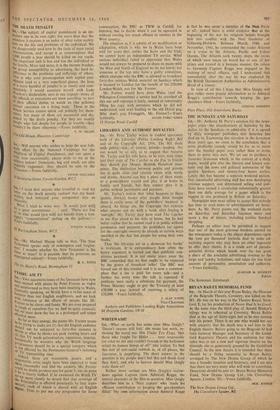S ik,—The subject of capital punishment is an im- Portant one
in its own right; but more than that the attention it receives is an index of what value society Puts on the life and problems of the individual. We are dangerously used now to the facts of mass racial stermination, and accept it as commonplace that .,6.,°00 people a year should be killed on our roads. ,',110 important unit is less and less the individual or family. More and more, it is the income bracket, tao group susceptibility to advertising, the herd in - difference to the problems and sufferings of others. rs.hat is why your preoccupation with capital pun- i'llolent (and at a very superficial glance, the lives r a mere handful of people) is so timely and coin- Mendable. I would associate myself with Lady \Yootton's declaration, save in one respect—many of lac officials at executions arc most unwilling 'as part af their official duties, to watch its [the gallows] rbarrect operation on a living body.' Those in the Service cannot Speak out publicly for them- :efts, but many of them are nauseated and dis- "sted by the death penalty. Yet they are mostly PeoPle who feel deeply for people in trouble—they wouldn't be there otherwise.—Yours faithfully,
tie Old House, Hauxton, Cambridge
'• T. W. MEADE


































 Previous page
Previous page